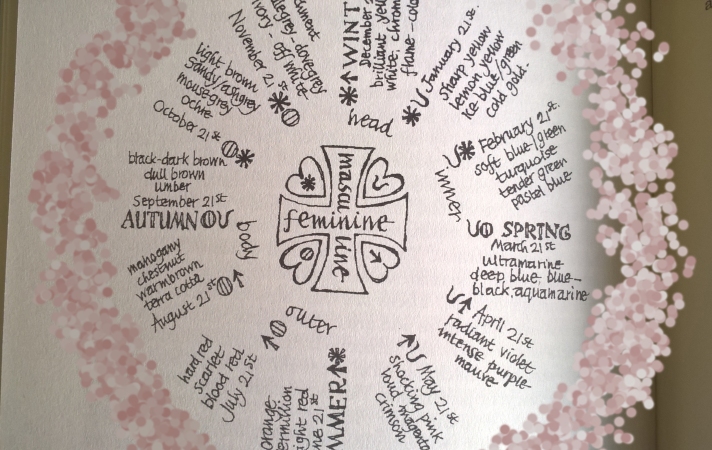I have really got to the end of this whole sexual identity thing. I no longer see what it has to do with humanity, love or human reality, emotional or sexual.
I think it’s very true that most people have a marked need for partners of one sex or the other, and that need means that many people, as a generality in their life, will be overwhelmingly heterosexual or homosexual as a rule. But people can have exceptions too, and I have come to believe that Tammo de Jongh was right when he said that people are essentially bisexual. Except that we don’t yet have an understanding of that, because we think in categories, not real descriptions, so we imagine “bisexual” is a box someone ticks, and you then put them in that box, but that’s not how anyone is. If everyone is bisexual, it includes all the people we think of as gay and straight as well. But this is not a statistical, demographic, outward reality, it is an inward, implicit condition of being human.
Moreover of course, it does not mean that everyone is adaptable, malleable or available. Everyone is human and individual. It means everyone is just who they are, and the categories we have don’t constrain love and desire.
I’ve had enough of being “gay”. Not of being homosexual in relationship orientation, which despite the unpleasantly clinical nature of the term, at least describes something. No, I was made for loving a few men utterly and completely, every fibre of my being says so, but I’m not “gay”.
We need to stop judging, and start listening, if we are interested in people, rather than ulterior motives, or the demands of intellect and politics and conformism. We need to look to the inward, and stop listing the outward. We need to respect the deeply personal, life and death nature of real, deep love, from the body through to the soul. You only have so many chances in your life for this kind of happiness, and you need to take them. And I still think that Tammo’s understanding of this is a key.
***
I knew I was deeply attracted to men and maleness since I was about 11. Between 11 and 16 I came to terms with being “gay”, despite finding nothing I could relate to in what I saw of the “gay world”. I got my inspiration from Allen Ginsberg, Walt Whitman and Edward Carpenter. I’ve thought of myself as gay ever since, despite finding inexplicable antipathy or incomprehension from a great deal of the gay mainstream when I came into contact with it. I was always the one that got told I “wasn’t really gay”, or “gay enough yet”, or that I was “bisexual” (really, I wouldn’t have had a problem with that, but I’ve never been interested in sex with women). I looked on camp and drag with tolerant disinterest. I found terms like “butch” and “femme” described nothing of real masculinity or femininity, rather they seemed to elevate fabrication and artifice over essential nature. The “gay world” I all too often met seemed to have a revenge against depth and innocence lodged within it. A revenge against human nature. A bitter disbelief in love.
And I say this because I have seen so many deeply unhappy, dysfunctional and destructive people in the “gay community”, who appear to be trapped in the socialization they have undergone within that ghetto. I can’t say they have been served well by the constraints of the category of “gay”. Any human being deserves better than that.
I still can’t stand it when people see a straight man or woman have a relationship (or just sex) with someone of the same-sex, and immediately they’re seen as “bisexual”, or “gay but can’t decide”, or “bi-curious”, anything other than the human being they are. What box can we put them in? Where can we put them in our world? How can we use them to back up our world view? Truthfully, if anyone has that reaction, they didn’t deserve the privilege of knowing. Not one bit.
An end to this. We are human, and we need to show some humility and respect in the face of the possibility of love and life.
Gay is over.
And just think on this: if you are gay as the world says it is, then you make up a maximum of 1 in 10 of the population (probably less). There are only so many people you can have a deep relationship with, because indiscriminate, or just conveniently available sex is not a source of deep fulfilment, and neither is convenient relationship. It is something else that makes it real. So if you are 1 in 10, then out of all the people you could find fulfilment with, 9 out of 10 won’t want you if it works like people say. Add to that the constraints of dogmatic monogamy and, well we’re not talking about a recipe for fulfilment.
I don’t believe it works like that though. Because it is actually about a profound experience of energy that flows through our relationships, where we become our true selves and also help to transform one another and our shared lives. It is something deep, personal, but also bigger than us in a sense. And people will surprise you, because that is what love does. We need to dissolve the taboos and condemnations of same-sex relationships so that love can find its way, and we need to also become open to the real nature of love for everyone, and things like real polyamory (not indiscriminate open relationships), for us to find the honest way of allowing people to have fulfilled lives.
But we don’t need the prison of categorised sexual identity. We’d do better to understand our energy and what fulfils it in our case, and really believe in love.

11th June 2016: very minor edit to 8th paragraph to clarify meaning.

Thank the gods you said that. Tho I disagree with Tammo on us all being bisexual more we are all pansexual. When all is said and done what genitals one has make no odds if minds and soul connect then love is valid.
I don’t even really think we are bisexual, as the term has so many associations in relation to straight, gay etc, and that’s not what I mean either really, but I get what Tammo was getting at. We’re not all bisexual as that is understood now. We’re human, that’s the only thing that makes sense 🙂
Exactly, we are all human and we all deserve to know love without the stigma of being this or that or something else.
absolutely 🙂
I actually really care about this
Me too, it has been a rough ride learning it tho
Reblogged this on Some Assembly Required and commented:
You nailed it here Mo
I missed this when you first wrote it. Well expressed and true in many respects. I think labels of sexuality can be useful in some circumstances, but not all. Sexuality is so diverse and variable that the more experience you have (of life in general, not just of sex and relationships) and the more you explore it the less meaning it has.
thank you 🙂 yes, I think the labels are useful to a point, just pragmatically, but they seem to be an overly restrictive tool rather than real descriptions
0 Pingbacks
browse more topics here
Archives
Facebook Page
Pages
Summer Thunder by Mo Batchelor is licensed under a Creative Commons Attribution-NonCommercial-NoDerivs 3.0 Unported License.
Meta
You Tube Channel